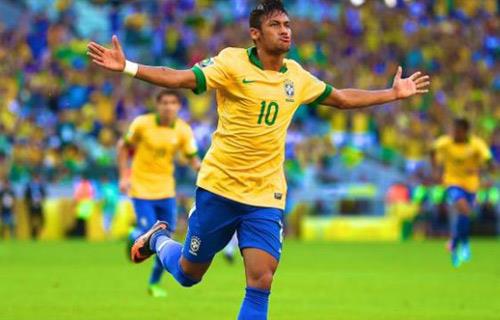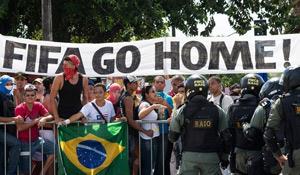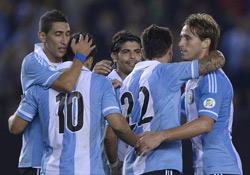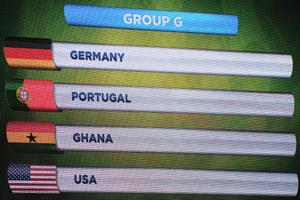
The 2014 FIFA World Cup is looking good. Despite continuing protests, questionable referee calls, and major technical problems with Jennifer Lopez and Pitbull’s performance of the official song “We Are One (Ole, Ola)” at the opening ceremony, the opening match had a record audience.
The host country, Brazil, as expected, won its opening match against Croatia. But the winners stateside included ESPN, which scored with a viewership of 4.4 million, a 55 percent increase over the 2010 South Africa opening match. Another 1.1 million saw the game via a live stream on WatchESPN. While this was the largest US audience for a FIFA World Cup opening match, it also was the largest U.S. audience for a match in which the American team didn’t play.
Univision surpassed even those totals with an average audience of 5.1 million, and another 1.9 million on its digital live stream. Social media companies such as Facebook and Twitter also did well. Twitter has been encouraging its users to follow #WorldCup, and has a “starter kit” to show you how to follow the teams in real time.
The games are going so well, Dr. Eric Zillmer, professor of neuropsychology and director of athletics at Drexel University in Philadelphia, told TV Worth Watching, that the most notable thing about them right now seems to be really bad referee calls, including in the opening match.
“This is a common problem in international soccer," he explained, "because the refereeing crews from Japan and Columbia do not have the same level of skill and experience the top international players have. Having said this, refereeing is a difficult occupation and is part of the game. Additional technology, such as the goal technology introduced in this World Cup, will only make the game of soccer more complicated and expensive. So true soccer fans know that bad calls are part of the game. They will complain about it bitterly, but ultimately move on despite it.”
Less notable now are the local protests against the World Cup.
As Zillmer put it, “Once the ball gets kicked, all eyes are on the ball and play takes over. Sports becomes the most important part of life. Everything else diminishes, including issues of poverty and labor unrest, at least temporarily. The World Cup is psychotherapy for the masses.”
 Dr. Melissa Birch, an associate professor in the School of Business at the University of Kansas, and an expert on Latin America business, agrees. She told TV Worth Watching she thinks the focus on the backlash was a mistake: “The thing that strikes me is that the U.S. press has missed this idea that the World Cup getting politicized is because of the [October] elections…. FIFA is not a non-profit, it’s an entertainment organization, so to suddenly criticize the games for not doing more to address poverty and education is a mistake. I think it only got raised 'cause it’s an election year.”
Dr. Melissa Birch, an associate professor in the School of Business at the University of Kansas, and an expert on Latin America business, agrees. She told TV Worth Watching she thinks the focus on the backlash was a mistake: “The thing that strikes me is that the U.S. press has missed this idea that the World Cup getting politicized is because of the [October] elections…. FIFA is not a non-profit, it’s an entertainment organization, so to suddenly criticize the games for not doing more to address poverty and education is a mistake. I think it only got raised 'cause it’s an election year.”
She says that Brazilian politicians pushed this idea. “The opposition sees a real opportunity here. If the games go badly, they can make the government look bad. So it’s certainly in their interest to highlight projects that come in over budget.”
Brazil spent $11 billion getting ready to host the World Cup. Birch says much of the spending went to infrastructure projects that Brazil needed to work on anyway, like more roads and airports. “With the rise of the middle class there’s been an expansion of those that fly, so even to serve normal domestic traffic Brazil was going to need these. The World Cup put a deadline on this… I’m not sure this was bad.”
Still, the protests were a big enough story that ESPN responded. Their sports analysts discussed the situation, at least in passing, before getting into the first match. And the sports network folded the unrest into a beautifully produced opening film of the World Cup. Actor Jeffrey Wright voicing the introduction to the country: “Here is Brazil, the tropical paradise. And here is Brazil, the streets a simmering groundswell of people determined to have their voices heard, and here is Brazil, the homeland where passion for a game lives and breathes…”
Zillmer says: The success in Brazil will be a psychological one, not financial. That is, can soccer become a sport admired with passion as it is around the world?
If you’re still getting to know the competitors, it’s hard to know whom to watch. There are 32 international teams competing, and hundreds of players. However, those who tuned in for the opening game got to see arguably one of soccer‘s best players, Neymar from Brazil [full name Neymar da Silva Santos Jr.], according to Zillmer. His other picks of the best: “[Cristiano] Ronaldo for Portugal and [Lionel] Messi for Argentina. Neymar is a magician on the ball and already scored two goals in the opening game for Brazil. Ronaldo plays and acts like a matador, with the brash personality to go with it, and Messi is the Pete Rose of soccer.”
 One man most likely to watch Messi play is the Argentinian-born Pope Francis. He urged the World Cup to be a way to bring the world together in solidarity and teamwork. He also said that, given his position with the powers that be, he has promised Brazil he will remain neutral and not pray for his home team to win. Argentina’s first game is today (Sunday, the holy day.)
One man most likely to watch Messi play is the Argentinian-born Pope Francis. He urged the World Cup to be a way to bring the world together in solidarity and teamwork. He also said that, given his position with the powers that be, he has promised Brazil he will remain neutral and not pray for his home team to win. Argentina’s first game is today (Sunday, the holy day.)
The best players and the Pope aside, what really draws the bigger U.S. audience is the home team. The Americans play their first game on Monday, June 16 at 6 p.m. ET. (Note that ESPN starts its coverage of each match half an hour before kick time.) The U.S. faces Ghana, the team that has beaten them in last two World Cups.
So what makes this time different? “In Jürgen Klinsmann,” says Zillmer, “Team USA has a coach who has re-energized U.S. soccer, and has insisted on a modern style of play focusing on attack, attack, and attack. Currently ranked 14th in the world, the fact is, nobody wants to face Team USA in the tournament.”
Zillmer also praises many of the players: “U.S. players to watch include goalie Tim Howard, who reminds me of Spider-Man. Michael Bradley is Team U.S.A.’s best player, passer and its quarterback, who roams the midfield exploiting angles and opportunities. Striker Clint Dempsey, who hardly ever touches the ball, except when he scores, is the team’s ‘assassin.’”
 But he warns, “The U.S.A.’s Achilles heel, however, has been its back four defense, and they will be tested. Emerging from Group G, the ‘Group of Death,’ will be difficult, given that three-time champion Germany, a favorite, Portugal -- No. 3 in the world -- and Ghana, a talented and athletic opponent, all are formidable opponents.”
But he warns, “The U.S.A.’s Achilles heel, however, has been its back four defense, and they will be tested. Emerging from Group G, the ‘Group of Death,’ will be difficult, given that three-time champion Germany, a favorite, Portugal -- No. 3 in the world -- and Ghana, a talented and athletic opponent, all are formidable opponents.”
There is a glimmer of optimism, though, as Zillmer suggests: “Could this be the World Cup that the U.S.A. breaks through? If Team U.S.A. manages to survive pool play and go deep into the tournament, Americans will experience and embrace something they have never witnessed in our sports culture before: a serious and contagious case of World Cup fever!”
--
The World Cup runs until July 13. All the English language games will be broadcast on ESPN, ESPN-2 or ABC. (Here is the full schedule, and you can also refer to Univision's Spanish-language coverage schedule.